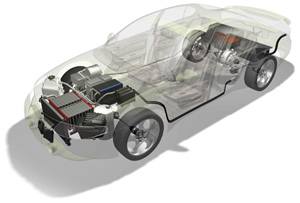|
Home
> FUEL CELLS - a brief overview
Fuel cells are a hot topic in vehicle design at the moment
and almost everybody has heard of them, but how do they work?
This is a brief overview of the hydrogen fuel cell concept.
A fuel cell is an electrochemical energy conversion device,
the same as a battery, the
difference being that a battery has chemicals sealed inside
and when these are used up the battery is dead. In a fuel
cell the chemicals can be topped up, generally with hydrogen
and oxygen (the oxygen coming from air). However if a reformer
(a device which converts hydrocarbon or alcohol fuels into
hydrogen) is used natural gas, propane or methanol can be
used instead of hydrogen but the efficiency is reduced. the
difference being that a battery has chemicals sealed inside
and when these are used up the battery is dead. In a fuel
cell the chemicals can be topped up, generally with hydrogen
and oxygen (the oxygen coming from air). However if a reformer
(a device which converts hydrocarbon or alcohol fuels into
hydrogen) is used natural gas, propane or methanol can be
used instead of hydrogen but the efficiency is reduced.
There are several different fuel cell systems, however the
proton exchange membrane fuel cell is the most likely to be
found in a fuel cell powered vehicle. When the hydrogen and
oxygen in the fuel cell is converted into water electricity
is produced in the process this electricity comes in the form
of a direct current voltage that can power electric motors
which in turn drive the wheels of a vehicle and power its
other electrical systems. A benefit of fuel cell powered vehicles
is that they are extremely environmentally friendly when compared
to other vehicles.
Some of the many vehicles powered in one way or another by
fuel cells are:
ENV
Hydrogen Bike
Bombadier
Embrio concept
Hyundai
Greenspeed Gator concept
Jeep
Treo concept
Honda
Kiwami
Mercedes
Mojave Runner concept
Peugeot
H2O concept
rMoto electric
superbike concept
GM
AUTOnomy concept
Toyota
MTRC
Morgan
LIFECar concept
TheBMW
H2R does not use a Hydrogen fuel cell but instead favours
an internal combustion engine which runs on hydrogen.
|

